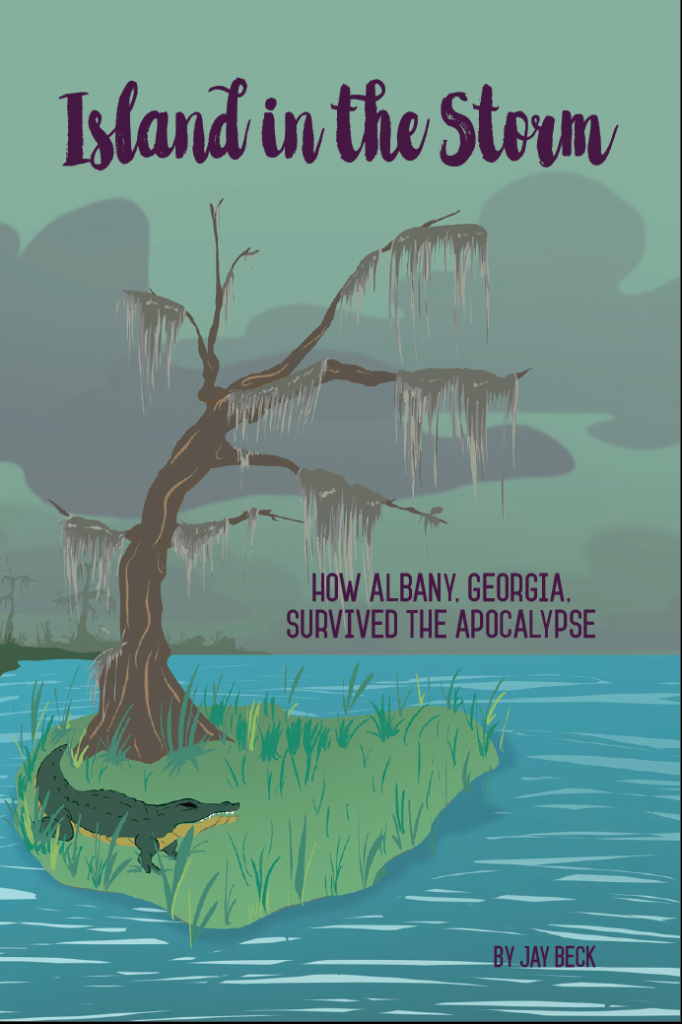- By Jim Hendricks papajimhendricks@gmail.com
 ALBANY — Political consultant Jay Beck’s latest novel, “Island in a Storm,” works hard to disprove the title, illustrating that in truly stormy times, no person or community can afford to be an island unto itself.
ALBANY — Political consultant Jay Beck’s latest novel, “Island in a Storm,” works hard to disprove the title, illustrating that in truly stormy times, no person or community can afford to be an island unto itself.
“If you’re going to evolve in the world, you need to do it together,” Beck said in a recent interview conducted at the Albany Mall center court. “I think part of this is in the context of the emotions we’ve had in the past few years, politically and everything else. There’s too much division.
“I’d like to argue that to move forward, it’s so much easier to do it together. Set aside some of the almost petty differences we have and do it together. We’ve become a world where we want to confront everything, rather than find solutions that are not so confrontational.”
Beck, an Albany native and Vietnam War veteran who worked in the Executive Office of President Jimmy Carter, has placed his latest story in a familiar setting — Albany and its surrounding region. And he’s placed his hometown, along with the rest of the nation and world, in serious peril.
Set in a not-too-distant, post-COVID future, a global disaster has struck. In this world, a different type of malignant virus — one that destroys computer systems — has brought down the power grid. In turn, industry, commerce, communication and nearly every other aspect of life comes to a screeching halt.
It’s a situation that may not be as farfetched as it may seem at first glance. In 2010, an internet virus dubbed Stuxnet targeted and crippled Iran’s uranium enrichment facility at Natanz.
“The Stuxnet worm we created that wiped out Iran’s nuclear power, they regenerated that with Russia’s help,” Beck said, adding there was a counterattack by the Iranians using that regenerated virus. “We found it and killed it off. It was nothing to this magnitude, but I wanted to have some germ of truth in the setup.”
So, what happens when an apocalyptic disaster strikes? Well, it’s mostly bad. Rationing of scarce food and medical supplies are at the forefront.
“Once you wipe out all the electricity, everything dies and within three weeks the food is gone,” Beck said. “There’s no refrigeration and no trucks are coming in because you can’t pump gas. The immediate crisis is, how do we feed these folks?
 “They (the characters) had to create a whole military-type system of feeding people, and they worked together to do that, then went out to try to get other communities to help and join hands. Another bonding environment.”
“They (the characters) had to create a whole military-type system of feeding people, and they worked together to do that, then went out to try to get other communities to help and join hands. Another bonding environment.”
But not everyone is into bonding with other communities for the common good.
One of the book’s protagonists, Henry Graham, was raised in an off-the-grid community led by his father, a former Marine sniper. Henry and cohorts go on bank robbery trips to raise funds to buy necessities for their community, which is shielded from the outside by a massive, dangerous swamp.
The swamp was the starting point of the book and essentially becomes a character itself, Beck said. An inside image at the front of the book is a boatman traveling down a swampy waterway. It’s a 1950s painting by Beck’s mother.
“I found out coming down here about the swamp,” the Atlanta political consultant and marketing and communications veteran said. “And the more I learned about it, the more I started thinking about it and remembering stories from my childhood, and how big that area is.
“Then I started thinking, ‘What if someone wanted to live off the grid and moved out there?’ Then, ‘What if there were some nefarious economics? The whole idea you could rob a bank in Alabama or Tennessee and then come back here to hide.’ It was a good plot vehicle for me. And what kind of people would live there? The characters started emerging. I wanted the daddy to be the Marine sniper who teaches the son to be that survival-skill person. All of them learned how to do it, so when the crunch happened, they could come out of the swamp and help the people in the city.”
Henry’s foray into Albany is where he runs up on Iris Dozier. The daughter of Dougherty County Sheriff Jerico Dozier, she’s a nurse at Phoebe Putney Memorial Hospital, where Henry takes his father for treatment. Henry remembers seeing her by chance when they were 12.
“I wanted her to be somebody who was a little bit straight-laced, somebody who understood from an early age she wanted to be a doctor,” Beck said. “All of her life was evolving to that until her mom got sick.
“After her mom died, her father was a wreck. In some ways, she was trapped, but it was her choice to be loyal to her family and her community.”
She and Henry, who is clearly representative of the old saying “country come to town,” have their respective insecurities, Beck notes.
“He’s awkward and he doesn’t feel like he has the background, education and sophistication to be able to deserve her or to compete for her,” Beck said. “I wanted both of them to have vulnerabilities and to share vulnerabilities with each other to make them characters that were believable, so you can understand their bond because they reinforce each other.”
Then there’s that thing about being a bank robber who’s taken a liking to the sheriff’s daughter.
“A lot of what I do is bifurcated environments — black and white, rich and poor, urban and rural. To survive in a real crisis like this that was created on top of the coronavirus, you have to pull together,” Beck said. “You’ve got to get over race, political affiliation, religion — all that stuff. If you want to survive in a very dire environment, you’ve got to work together. That’s the crux of what I was trying to bring together in the whole thing.”
Examples of that are Sheriff Dozier and Albany Mayor Lamar Ballard, who join forces to lead the city’s survival efforts.
“I wanted a strong civic leader here to take care of all the civic responsibilities in the area,” Beck said. “And I wanted a kind of legal, law-and-order leader, and that turned out to be the sheriff. They were still a generation apart — the sheriff’s a generation older than the mayor — and then there was the black and white difference, but I wanted them to be friends.
“These guys had known each other and got along, but I wanted them to be more than that. With all the racial animus and the masks we put on sometimes in the world, these were just buddies and race didn’t matter.”
The pair already had the good of the community at heart, so when disaster struck “they could communicate very easily and say I’ll do this, you do that and we’ll solve this problem.”
The nature of widespread disaster calls for leadership that has “a lot of dictatorial properties,” Beck said. “Somebody’s got to say, ‘This is how we do it.’ But then, how do you do that where there’s a way to grow back democracy and grow back an economic arena where there’s free enterprise?
“I wanted to imply that was what was happening. I didn’t spell out everything, but I wanted to show here were two civic leaders who you had enough confidence in that they could solve this problem and do it in concert with other people to make things happen so this whole area could survive.”
While Beck said he thinks Albany, at the center of a big agricultural region and with assets like Albany Technical College and Marine Corps Logistics Base-Albany, would be better positioned than many cities for a disaster of this magnitude, it would not be without serious challenges. In several cases, potential confrontations with adjacent communities are dealt with through negotiations. But that doesn’t always work in the dystopian world of Beck’s novel.
“Look at what happens when a hurricane comes through,” he said. “All the toilet paper and batteries are gone. But what if you had something big happen that went on for a long time? Can you imagine how empty the stores would be overnight? Then with the power cut, everything you had in the freezer is gone in a short period of time. Within about three weeks, everybody’s hurting. Then you have violence. Violence occurs close to Albany (in the book), and then gangs of violent people come together.”
Those outside the area — especially the paramilitary rogue group led by the villainous Rowdy Burdette that’s heading deliberately to Albany — know about those assets as well, which leads Mayor Ballard to try to negotiate a common defense agreement with MCLB-Albany.
“The holy grail is the Marine base,” Beck said. “In the story, that’s what kept everyone alive because it’s one of the two largest Marine depots in the world, and all the food, all the gas, guns, everything you need to survive is there.
“That’s one of the things, trying to negotiate with them to let’s work together in our community to help each other survive and to protect ourselves from encroachment from people who have purely bad ideas about what they want to do to us.”
Beck has quite a few moving parts heading into the Battle of Albany, and some liberties are taken as to how Albany and Dougherty County governments are structured to facilitate storytelling. Albany area residents also may notice some familiar names among the characters, with Beck having borrowed names of people he knows. The book also includes maps to help the reader visualize the locations of the action that takes place.
The idea of casting his hometown in the midst of a disaster predated COVID-19. His work on the book began in 2018, though the effects of the pandemic get mentioned as a recent event in the book. But COVID-19 has prompted him to do one thing — dedicate revenues from “Island in the Storm” sales to an Albany charity.
“All the proceeds are going to United Way of Southwest Georgia,” the author said. “We’ve had a scare here. We’re fortunately — God bless — getting over it. But a lot of people in southwest Georgia are under difficult circumstances. It’s an awareness that’s great to have togetherness.”
The cast of main characters, as one might expect, gets thinned out over the course of the story. Beck said he has not decided whether there will be a sequel to “Island in the Storm,” which reached No. 16 on Amazon’s list of dystopian fantasy books. He has thought about it, though.
“I thought about what it would be like three or four years down the road,” he said. “I thought about a world environment. How do you go back to creating factories, creating industries, other things that could build off this? I’ve played around with that in my head.”
First, however, Beck is working on the final part of a trilogy featuring his character Mark Young, a globe-trotting political consultant who has adventures in the 1980s era in Panama (“Panama’s Rusty Lock”) and Greece (“Casting Stones”). In the new book, Young will be involved in the 1992 presidential campaign with Bill Clinton, George H.W. Bush and H. Ross Perot.
Fortunately for Young, his alter-ego/creator has in-depth knowledge about that election. Beck served as deputy campaign manager for Perot.
Beck’s website is www.jaybeck.net.

